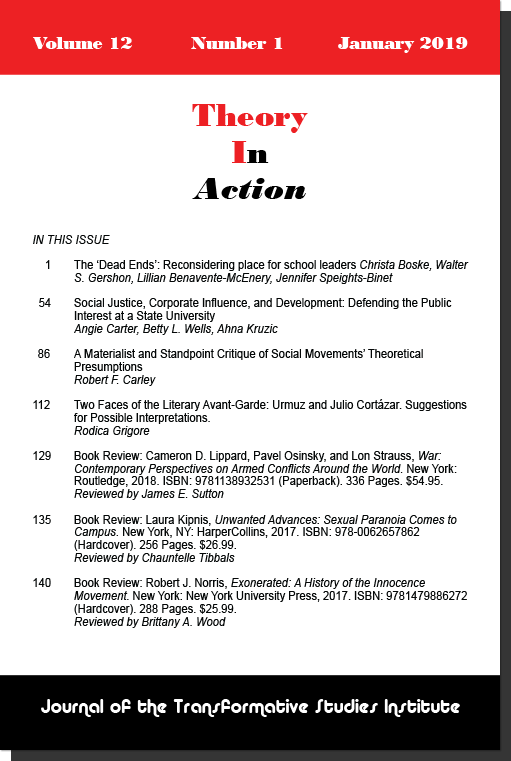On the political economy of equality
ISBN: 9789004262720
E-ISBN: 9789004262751
Haymarket Books, 2016
For more information or to schedule an interview with
John Asimakopoulos please email at jasimakopoulos@transformativestudies.org
Part of the series Studies in Critical Social Sciences
edited by David Fasenfest
About the Series
Modern capitalism began the 21st century seemingly victorious as the dominant social and economic organizing principle in the world. Rampant re- and de-regulation accompanied a wholesale attack on social, economic and political gains of the prior century under the guise of increasing competitiveness and the need to respond to the forces of globalization. The end of the cold war, the decline of the former Soviet Union, and the increasing foothold of capitalism in China all point to an unchallenged reorientation of the global political economy to reflect this ascendence of capitalist social relations. The peer-reviewed Studies in Critical Social Sciences book series, through the publication of original manuscripts and edited volumes, offers insights into the current reality by exploring the content and consequence of power relationships under capitalism, by considering the spaces of opposition and resistance to these changes, and by articulating capitalism with other systems of power and domination – for example race, gender, culture – that have been defining our new age.
About the Book
The book formalizes utopian principles of direct democracy in the language of political economy. The theory to praxis model is founded on the principle of equality and provides a structural alternative to market-based liberal democracies. These alternatives herald more idealistic visions of society. It is written as a work of critical theory with textbook elements such as key-terms. It combines quantitative data and analysis with sociological, political, and economic theory. The book is framed within conflict theory (critical and analytical) and structural influences by Robert Merton (Social Theory and Social Structure) and Ralf Dahrendorf (Class and Class Conflict in Industrial Society). It applies pragmatically the libertarian socialist political economy of Proudhon, Bakunin, Kropotkin (later Gramsci) with Marxism and classical political economy.
Abstract
It is argued from the perspective of critical theory that direct democracy is possible in modern large-scale societies only if it is structurally incorporated in both the economic and political systems, not based on utopian visions. Social Structures of Direct Democracy examines existing forms of direct political and economic democracy such as referendums, participatory budgeting, and worker self-management arguing that they could be incorporated within existing institutions based on every day practices. Given that existing representative systems are inherently fraudulent, it is proposed that positions of authority within political institutions e.g., legislatures and economic institutions e.g., executive boards of top corporations be randomly selected—in statistical terms—leaving the demos as the executive through referendums and electronic voting. Another key idea based on the concept of equality is introducing a singular common wage while maintaining private ownership of productive resources, markets, currency, and compulsion. Also, the book will show that a system based on material and social equality will maximize productive and social efficiencies more than market-based economies—even by market definitions.
Brief Description
The Great Recession has unfolded into global political and economic collapse, unresponsive discredited institutions, giving rise to social justice movements such as Occupy Wall Street. Many point to rising levels of inequality as the cause of our malaise. Rising inequality, in turn, is generally seen as the outcome of political and economic institutions operating on the principles of neoliberalism. Politically, people feel they have no substantive voice leading to mass protest movements. Economically, the wage-based system of capitalism creates dramatic increases in extreme poverty with no respite for the foreseeable future.
By building on existing theoretical and applied forms of direct democracy the book addresses these problems by developing a working model of large-scale society based on direct political and economic democracy. It is argued that egalitarian distribution of resources will lead to greater innovation and economic growth that is sustainable with desirable social outcomes. This is in contrast to market economies based on individualism, competition, and inequality.
The theory to praxis model argues that direct democracy can only function if implemented across the entire social structure, especially the political and economic systems. This is possible if based on the experiences of daily life by modifying existing institutions. Based on the argument that direct democracy alone can provide substantive equality, it is proposed legislative and judicial branches be filled through statistically random selection e.g., by lottery, while leaving the demos as the executive through various mechanisms e.g., internet voting modeled on the principle of state propositions.
Direct economic democracy is also attainable by modifying existing institutions of production. It is proposed the top corporations have half their boards of directors filled through statistically random selection e.g., by lottery, from the demos, the other half by statistically random selection from workers of the enterprise. Here, citizen-workers would set corporate policy which affects society at large while leaving ‘ownership’ of the means of production private. The second proposal is establishing a single standard national wage, leading to increased economic efficiency and development that will be explored.
Special Features of the Book
In contrast to most works that develop complete future visions of society or focus on either the political or economic, the theoretical or applied, my book brings all four together in a theory to praxis model showing readers how a pragmatic system based on principles of direct political and economic democracy could function by altering existing institutional arrangements. The book is the first contemporary effort to reconcile utopian models of the socialist libertarian theory known as anarchism or communism with traditional Marxism and classical political economy.
About the Author
John Asimakopoulos, Ph.D., is Professor of Sociology at the City University of New York-Bronx and executive director of the Transformative Studies Institute (TSI), an educational think tank. He has advanced degrees in and has taught sociology, political science, and economics resulting in a unique interdisciplinary perspective. His students include undergraduates and graduates from diverse ethnic, economic, and educational backgrounds who honor him for over 20 years with the highest teaching evaluations. His research is focused on social movements, critical theory, and international political economy. Asimakopoulos is author of Revolt!, The Accumulation of Freedom, many journal articles, book chapters, and is editor in chief of Theory in Action, an interdisciplinary peer-reviewed journal.

